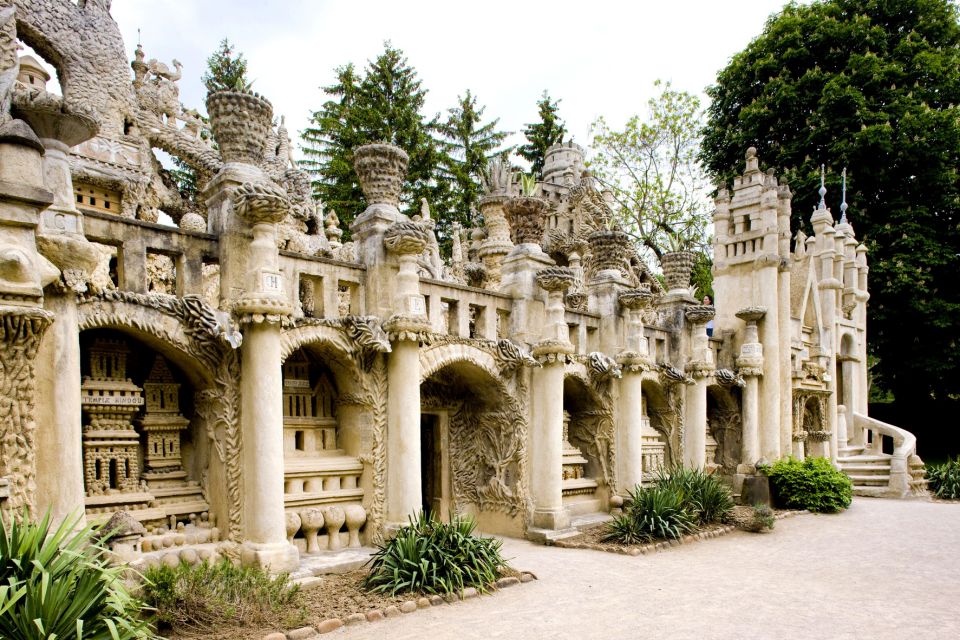
Palais Idéal du Facteur Cheval RhôneAlpes France
Ferdinand Cheval (19 April 1836 - 19 August 1924), often nicknamed Facteur Cheval ("Mail Carrier Cheval") [1] was a French mail carrier who spent 33 years building Le Palais idéal (the "Ideal Palace") in Hauterives, in southeastern France. [2][3] It is regarded as an extraordinary example of naïve art architecture. Ferdinand Cheval.
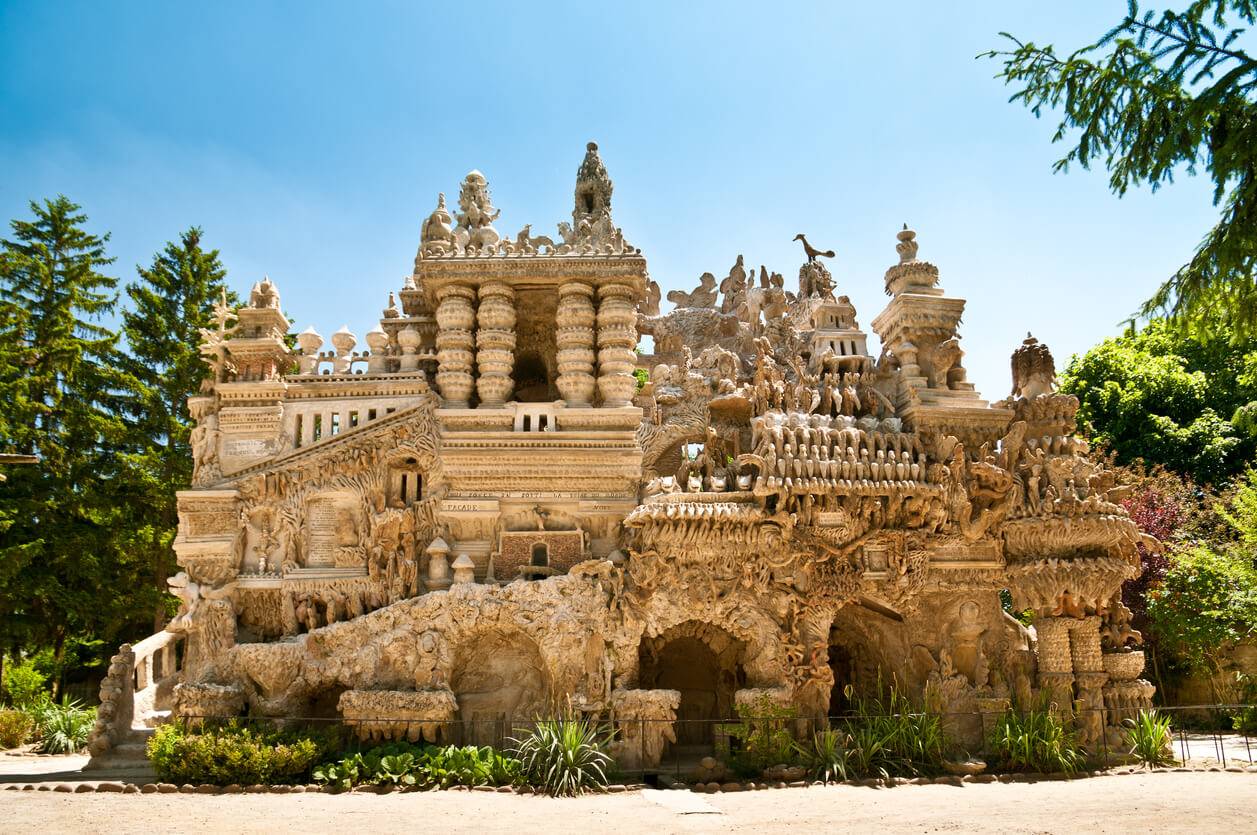
Le palais idéal, un dépaysement garanti Pratique.fr
Le Palais Idéal: The Palace of a Postman's Imagination It took Ferdinand Cheval 33 years to build his dream palace, and eight more to build his own tomb. The two monuments, designed with stones he found as a postman, are now considered masterpieces of naive architecture. March 3, 2023

Le Palais idéal du Facteur Cheval, le chef d'œuvre d'un autodidacte Détours en France
Construction on the massive structure (aptly named Le Palais ideal) began in April of 1879, and the labor of love was completed 1912. It stands as a tribute to the power of artistic endeavor and determination. Source: Wild Birds Collective Over the years, Cheval reflected on the pebble castle frequently.

Things to See in France Le Palais Idéal (The Ideal Palace) An Exploring South African
This building is the sole handiwork, from start to finish, of one man, a rural postman, named Ferdinand Cheval. In the following narrative, M.Cheval gives an account of how he came to conceive and build his "Dream Palace", a remarkable instance of human tenacity and perseverance. "A good many visitors, after examining my "Ideal Palace" or my.

Palais Idéal du Facteur Cheval (façade Nord) c'est tout ça, la France Facteur cheval, Cheval
The Ideal Palace was classified as a historical monument by Malraux in 1969. #2 Favorite monument of the French The Ideal Palace came in 2nd position among 14 sites in the ranking of the French people's favorite monument in 2020. #3 Ideal for families
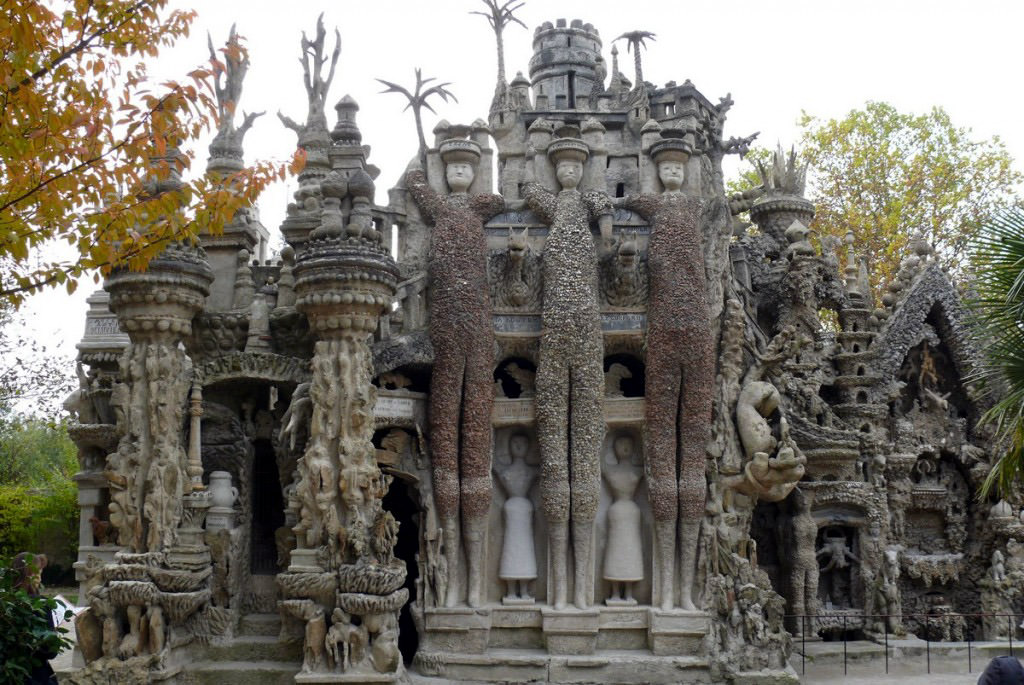
Le Palais Ideal Series 'The most wonderful castles and palaces'
The Palais Ideal At the end of the 19th century (from 1879-1912), the local postman - Ferdinand Cheval - spent his spare time very industriously and slowly built a remarkable building, mostly using stones and pebbles that he collected during his deliveries, now known as the Palais Ideal.
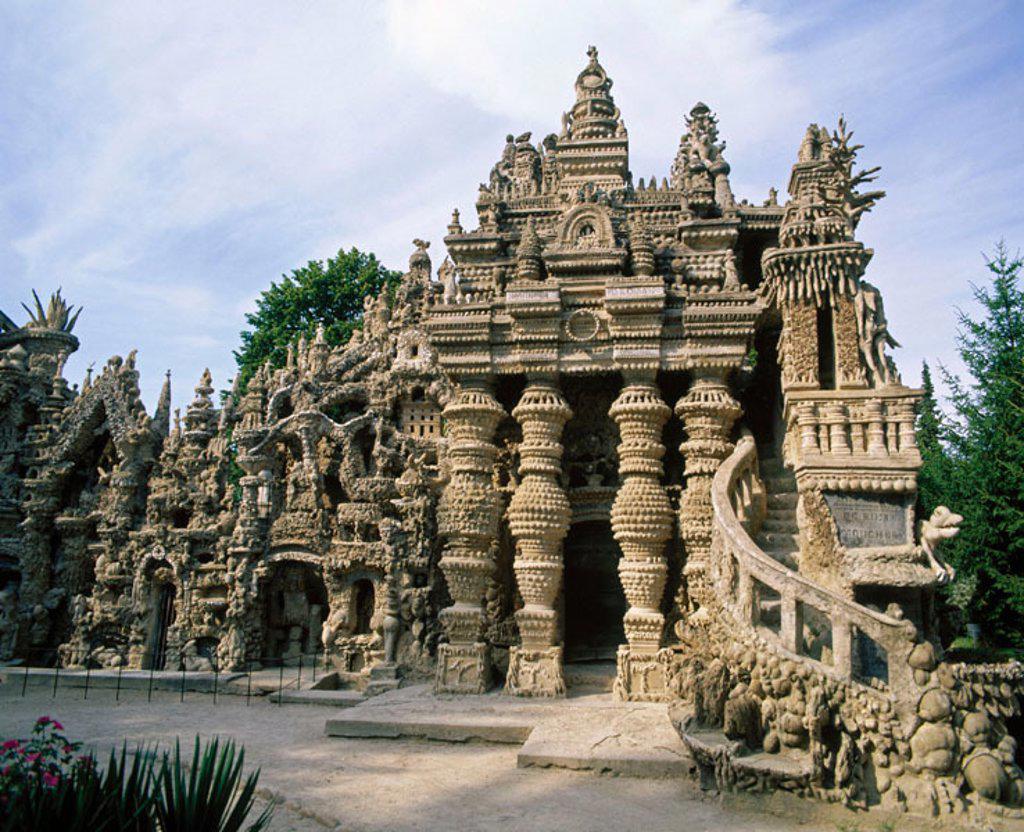
Palais Idéal (Ideal Castle) by Ferdinand Cheval near RomanssurIsère. Drôme department, France
After a lifetime devoted to creating such marvelous monuments, endless rest is surely what this talented postman deserves. Louise Flatley is one of the authors writing for The Vintage News. Deep in the heart of rural France, there stands an incredible building. The Palace Idéal du Facteur Cheval stands 45 feet (14 meters) high and 85 feet (26.

Le Palais Idéal du Facteur Cheval Cool places to visit, France travel, France
A unique monument, the Ideal Palace was built at the end of the 19th century by one man alone: Postman Cheval. A self-taught artist and architect, he devoted thirty-three years of his life to.

Le Palais Ideal, France. Built usual French postman Ferdinand Cheval, an enthusiast for 33 years
Ferdinand Cheval ( French pronunciation: [fɛʁdinɑ̃ ʃəval]; 19 April 1836 - 19 August 1924), often nicknamed Facteur Cheval ("Mail Carrier Cheval") [1] was a French mail carrier who spent 33 years building Le Palais idéal (the "Ideal Palace") in Hauterives, in southeastern France.
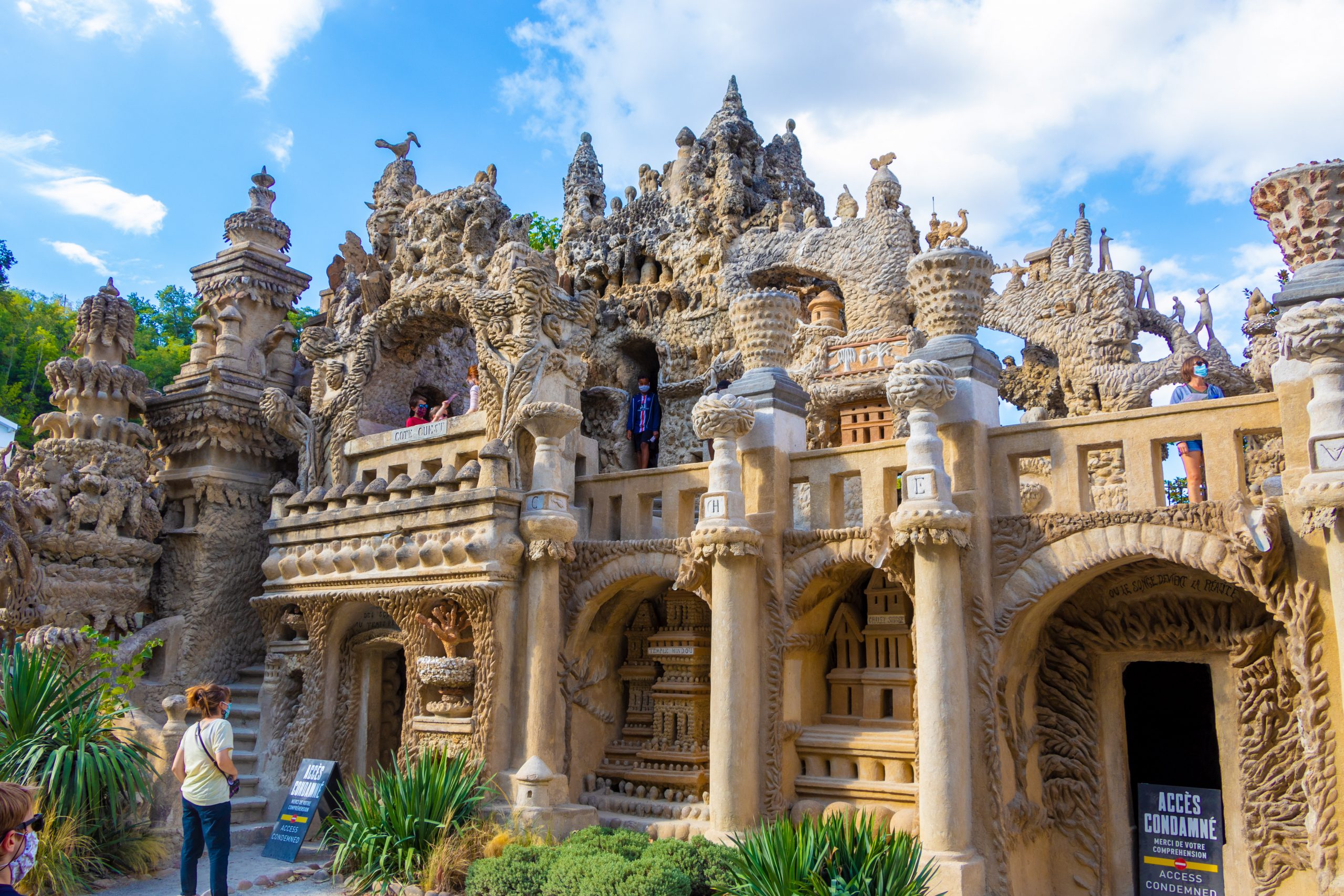
Le Palais idéal du Facteur Cheval un palais unique au monde en France
Le Palais Idéal du Facteur Cheval With a sense of wonder, I approached Le Palais Idéal du Facteur Cheval (The Ideal Palace of the Postman Cheval). I was enticed by a short article I had read in a magazine and had no idea of what to expect on arrival. It's not your typical tourist Mecca but well worth the drive to search it out.

Le Palais Idéal (the "Ideal Palace"), designed and built by Facteur Ferdinand Cheval (18361924
Joseph Ferdinand Cheval (1836-1924), or Le Facteur, was a postman from Hauterives, France. Cheval was inspired to build Le Palais Ideal (the Ideal Palace) after tripping on a stone in 1879. From that point on he gathered stones daily for his structure as he delivered mail.

Palais Ideal facteur cheval, Hauterives, Drôme, Rhone Alpes Auvergne, France, Europe Stock Photo
Location: 8, rue du Palais 26390 Hauterives - France Official website. architecture, building, castle, castles palace Ferdinand Cheval was a French postman who, inspired by a dream, spent 35 years building the "Palais Ideal", a unique and whimsical palace considered one of France's cultural landmarks and a prime example of naive art architecture.

Destination le Palais Idéal, France Rebecca Goes Rendezvous
Le Palais idéal (aussi appelé le Palais idéal du facteur Cheval) est un monument construit à Hauterives ( France) par le facteur Ferdinand Cheval, de 1879 à 1912. Chef-d'œuvre de l'architecture naïve et de l' art naïf, il est classé au titre des monuments historiques depuis 1969.

The 100 coolest works of architecture in the world Road trip france, Le palais idéal, Visit france
The Palais Ideal du Facteur Cheval is proof that imagination has no limits and that with perseverance you can make your dreams come true! We all have dreams, most will remain dreams though, but Ferdinand Cheval, a simple rural postman from the south of France is among the few who made his happen!

Palais Idéal Interesting Thing of the Day
Address : 8 Rue Du Palais, 26390 Hauterives. The Ideal Palace is located in Hauterives, a small village between Lyon and Valence. The easiest way to get there is by car (set the address in your GPS), but it is also possible to go by public transport combining trains and local buses. The nearest train stations are Saint Vallier sur Rhône and.
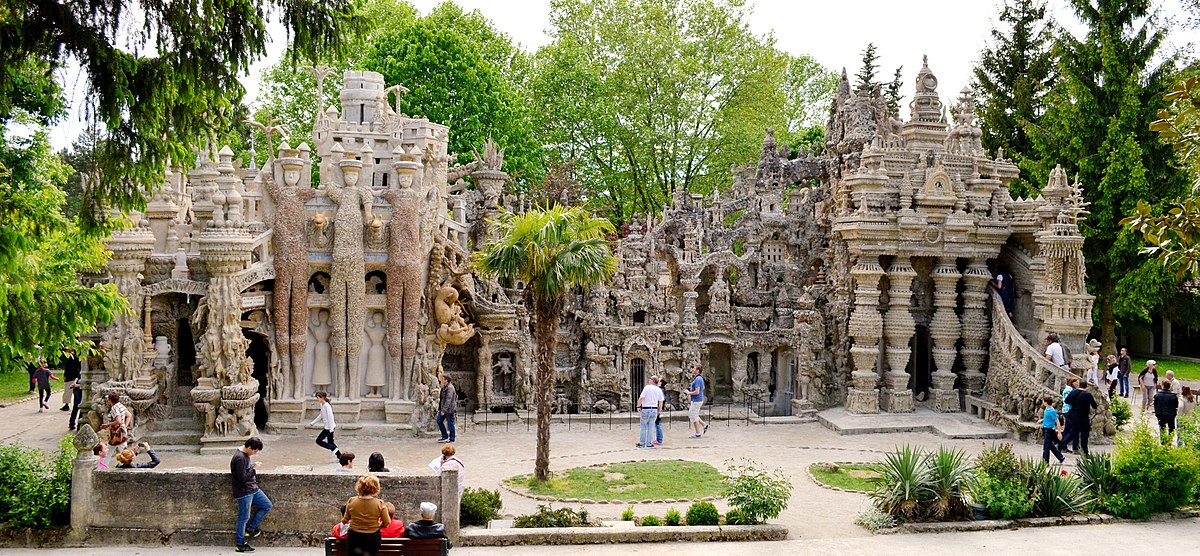
Palais idéal — Wikipédia
Le Palais Idéal du Facteur Cheval est le rêve d'un homme, piéton des postes, qui a concrétisé pierre à pierre après 33 ans de travail solitaire une œuvre unique.André Malraux en 1969 a classé le Palais Idéal : Monument historique. C'était pour lui le seul exemple en architecture de l'art Naïf. Suggest edits to improve what we show.